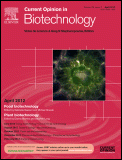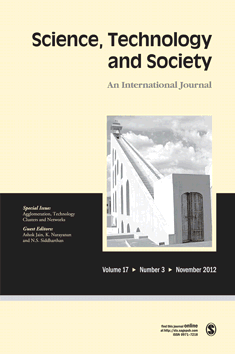
Asian Biotechnology and Development Review
Scope & Guideline
Exploring the Intersection of Biotechnology and Economic Progress
Introduction
Aims and Scopes
- Biotechnology and Sustainable Development:
The journal emphasizes the application of biotechnology in promoting sustainable development, particularly in agriculture, health, and environmental conservation. - Bioeconomy and Economic Implications:
It explores the bioeconomy concept, examining various strategies across countries and their socio-economic impacts, highlighting the importance of biotechnology in economic development. - Ethics and Governance in Biotechnology:
The journal addresses ethical and governance issues related to biotechnological advancements, including debates over GMOs, biosecurity, and public safety. - Indigenous Knowledge and Biotechnology:
It values the integration of indigenous knowledge systems in biotechnology, promoting fair and equitable benefit-sharing from biological resources. - Technological Innovations in Biotechnology:
The journal highlights innovative technologies such as CRISPR, synthetic biology, and their applications in various sectors, including agriculture and healthcare. - Global Perspectives on Biotechnological Practices:
It provides a platform for discussing biotechnological practices and policies across different countries, facilitating international collaboration and knowledge exchange.
Trending and Emerging
- Sustainable Biotechnology Practices:
There is a growing emphasis on sustainable practices in biotechnology, particularly in agriculture, as evidenced by increasing discussions on biofuels, plant growth promotion, and sustainable food systems. - Ethical and Governance Frameworks:
Recent articles reflect a rising interest in the ethical implications and governance of biotechnological innovations, especially concerning genetic editing and biosovereignty. - Integration of Technology and Biotechnology:
The intersection of Industry 4.0 and biotechnology is becoming a key focus, highlighting how digital technologies can enhance biotechnological applications and sustainability. - Global Health and Biodefense:
The journal is increasingly addressing the role of biotechnology in global health, particularly in the context of pandemic preparedness and biodefense strategies. - Public Engagement and Socioeconomic Impacts:
Emerging themes include the importance of public engagement in biotechnology discussions, particularly regarding its socioeconomic implications and equitable access to biotechnological advancements.
Declining or Waning
- Traditional Agricultural Biotechnology:
There is a noticeable decrease in papers focused on conventional agricultural biotechnology methods, as the field shifts towards more advanced techniques like CRISPR and synthetic biology. - Basic Research on Biotechnological Processes:
The journal appears to be moving away from purely foundational studies on biotechnological processes, favoring applied research that demonstrates direct societal impacts. - Narrow Focus on Regional Biotechnology:
Previous emphasis on biotechnological developments specific to limited regions has diminished, as the journal increasingly adopts a global perspective in its discussions. - Theoretical Discussions without Practical Applications:
There has been a decline in theoretical explorations that do not connect to practical applications or real-world implications, as the journal seeks to maintain relevance to current challenges.
Similar Journals

BMC BIOTECHNOLOGY
Transforming Ideas into Biotechnological BreakthroughsBMC Biotechnology, a leading journal in the field of biotechnology, is published by BMC and has been a pivotal platform for open-access research since 2000. With a focus on the diverse areas of biotechnology, including biochemistry, genetics, and molecular biology, this journal holds a prestigious Q2 ranking in its category for 2023 and demonstrates a commendable percentile rank in the top 66th for its Scopus listings. Operating out of the United Kingdom and covering research from 2001 to 2024, BMC Biotechnology is committed to disseminating high-quality, rigorously peer-reviewed articles that foster advancements and innovations in the biotechnology landscape. Researchers, professionals, and students alike will benefit from the journal's rich content and dedicated commitment to enhancing scientific discourse within the realm of biotechnology.

ELECTRONIC JOURNAL OF BIOTECHNOLOGY
Connecting Discovery with Practical Application in BiotechnologyThe Electronic Journal of Biotechnology is a premier Open Access journal published by Pontificia Universidad Catolica de Valparaiso, Chile, dedicated to advancing the fields of applied microbiology and biotechnology. With its inception in 1998 and an unwavering commitment to sharing knowledge, the journal has garnered a respectable ranking within the Q3 quartile for both its biotechnology and applied microbiology categories as of 2023, reflecting its significance in the academic community. Researchers and professionals will find its editorial rigor complemented by a robust platform for disseminating innovative findings, fostering collaboration, and driving forward biotechnology discussions. Given its inclusive approach, having transitioned to Open Access in 2014, the journal ensures that research is accessible to a global audience, making it a valuable resource for students, academics, and industry practitioners alike. Through the publication of original research, reviews, and critical insights, the Electronic Journal of Biotechnology aims to bridge the gap between scientific discovery and practical application, ultimately contributing to advancements in health, agriculture, and environmental sustainability.

New Biotechnology
Advancing the Frontiers of BiotechnologyNew Biotechnology, published by Elsevier, is a distinguished academic journal focused on the innovative realms of biotechnology and bioengineering. With an impact factor reflecting its strong presence in the field, this journal serves as a vital resource for researchers and professionals in the life sciences, offering insights into cutting-edge advancements and applications in biotechnology, molecular biology, and related disciplines. The journal's open access policy enhances its accessibility, allowing broad dissemination of knowledge and research findings. With a robust set of Scopus ranks placing it in the top tiers of its categories, including rank #36 in Biotechnology and #24 in Bioengineering, New Biotechnology represents a critical platform for scholars aiming to contribute to the ongoing dialogue in these rapidly evolving fields. Since its inception in 2008 and continuing through to 2024, the journal remains committed to fostering innovation and collaboration among scientists dedicated to advancing biotechnological applications, thereby significantly impacting medicine and industry.

MOLECULAR BIOTECHNOLOGY
Transforming Ideas into Molecular SolutionsMOLECULAR BIOTECHNOLOGY, published by SPRINGERNATURE, is a pivotal journal in the fields of applied microbiology, molecular biology, biochemistry, and biotechnology. Since its inception in 1994, the journal has aimed to disseminate high-quality research that explores the intersection of molecular biology and technology, fostering advancements in biotechnology applications. With an ISSN of 1073-6085 and an E-ISSN of 1559-0305, it has established itself as a significant contributor to the scientific community, currently holding a Q3 ranking across multiple categories including Applied Microbiology & Biotechnology and Biochemistry in the 2023 metrics. Although not an open access publication, the journal remains accessible through various institutional subscriptions, providing valuable insights and findings to researchers and professionals. Given its ongoing commitment to quality and relevance, MOLECULAR BIOTECHNOLOGY serves as an essential resource for those involved in cutting-edge research and innovation in molecular biotechnology and related disciplines.

CURRENT OPINION IN BIOTECHNOLOGY
Catalyzing Discussions on Cutting-Edge Biotech DevelopmentsCurrent Opinion in Biotechnology, published by Elsevier Science Ltd, is a premier academic journal dedicated to providing critical insights and evaluations on emerging trends and developments in the ever-evolving fields of biotechnology and bioengineering. With an impressive impact factor and ranking in the Q1 quartile across bioengineering, biomedical engineering, and biotechnology, this journal serves as an indispensable resource for researchers, professionals, and students alike. Spanning from 1990 to 2024, the journal facilitates scholarly discourse by featuring concise reviews authored by leading experts, covering cutting-edge topics and innovative technologies. With a strong presence in renowned databases such as Scopus, where it ranks within the top percentiles in multiple categories, Current Opinion in Biotechnology not only contributes to the academic community but also impacts industry practices, making it a highly relevant platform for those looking to stay at the forefront of biotechnology innovation.

Science Technology and Society
Advancing Dialogue on Science and SocietyScience Technology and Society is a premier multidisciplinary journal published by SAGE Publications India Pvt Ltd, focusing on the intersection of scientific advancements and societal implications. With its ISSN of 0971-7218 and E-ISSN of 0973-0796, the journal is recognized for fostering scholarly discourse and critical analyses from diverse perspectives, serving as a vital resource for researchers, professionals, and students alike. With a distinguished Q1 category ranking in the multidisciplinarity discipline and an impressive 79th percentile among 171 journals, it stands out for its rigorous peer review process and impactful contributions to the field. The journal has been in continuous publication from 1996 to 2004 and from 2006 to 2024, underlining its ongoing relevance and commitment to exploring how technology shapes society and vice versa. Although currently offering subscription access, it remains dedicated to providing researchers with innovative insights that bridge gaps between technology and social contexts, making it an essential addition to the academic community's libraries.

BIOTECHNOLOGY & BIOTECHNOLOGICAL EQUIPMENT
Fostering Collaboration in Biotechnological AdvancementsBIOTECHNOLOGY & BIOTECHNOLOGICAL EQUIPMENT is a leading open access journal published by TAYLOR & FRANCIS LTD from the United Kingdom, dedicated to advancing the field of biotechnology since its inception in 1990. Committed to disseminating high-quality research, the journal has transitioned to open access since 2014, enhancing its accessibility for researchers, professionals, and students alike. With a notable impact in the field, it is categorized in the Q3 quartile for Biotechnology as of 2023 and ranks #193 out of 311 in the Scopus categories for Biochemistry, Genetics, and Molecular Biology. The journal aims to cover a diverse range of topics related to both biotechnological advancements and the equipment that supports them, thus fostering innovative research and practical applications in the biotechnology sector. With an evolving scope that reflects the dynamic nature of biological research, BIOTECHNOLOGY & BIOTECHNOLOGICAL EQUIPMENT plays a crucial role in bridging the gap between laboratory studies and real-world applications, making it an essential resource for anyone involved in biotechnology research.

Biotecnia
Innovating the future of bioscience and technology.Biotecnia is a premier journal published by UNIV SONORA, dedicated to advancing the field of biotechnology through the dissemination of high-quality research and innovative findings. With its ISSN 1665-1456, this journal provides a vital platform for researchers, professionals, and students to share scholarly work that encompasses a diverse range of topics, including molecular biology, genetic engineering, and bioprocessing. Despite being based in Hermosillo, Mexico, Biotecnia’s reach extends globally, aiming to foster collaboration and knowledge exchange among the international scientific community. The absence of an open-access option enhances the journal's exclusivity while ensuring rigorous peer review, thus maintaining high academic standards. As biotechnology continues to play a pivotal role in resolving global challenges, Biotecnia stands as an essential resource for those committed to innovation and research excellence in this evolving discipline.

BioTech
Empowering Researchers Through Open Access KnowledgeBioTech is a forward-thinking academic journal published by MDPI, specializing in the dynamic fields of applied microbiology, biotechnology, biochemistry, bioengineering, and biomedical engineering. Established for promoting impactful research from 2021 to 2024, this journal aims to bridge the gap between laboratory findings and practical applications, serving as a vital resource for researchers, practitioners, and students alike. With its Open Access model, BioTech ensures that groundbreaking innovations are freely available to the global community, fostering collaboration and knowledge transfer across disciplines. In the 2023 rankings, BioTech holds a strong position in Q2 and Q3 quartiles across various categories, reflecting its commitment to high-quality research output. Being indexed in renowned databases, the journal enhances its visibility and reach, making it a preferred platform for sharing transformative ideas and discoveries in biotechnology and related domains. Set against the backdrop of Switzerland’s thriving research environment, BioTech is poised to become an essential resource in the rapidly evolving landscape of life sciences.

Biotechnology and Genetic Engineering Reviews
Unlocking the Potential of Biotechnology for a Better Future.Biotechnology and Genetic Engineering Reviews is a prominent journal published by Taylor & Francis Ltd, specializing in the rapidly evolving fields of biotechnology and genetic engineering. Since its inception in 1984, this journal has served as a critical platform for researchers and professionals to disseminate groundbreaking scientific findings, review methodologies, and discuss emerging trends within the domain. With a substantial track record of convergence in its publication history from various years, it currently holds Q2 rankings in both Bioengineering and Biotechnology, alongside a Q3 ranking in Molecular Biology for 2023. Its dedication to quality research is reflected in its Scopus rankings, which position the journal favorably within the competitive landscape of biochemistry and molecular biology. Although it is not an open-access journal, Biotechnology and Genetic Engineering Reviews remains committed to providing accessible insights to the global scientific community, making it an invaluable resource for students, academics, and industry professionals keen on advancing their knowledge in these crucial fields.